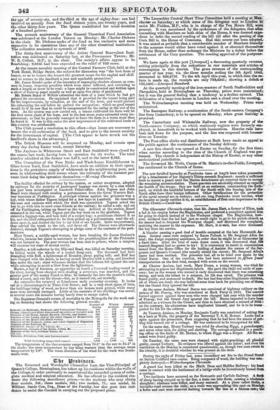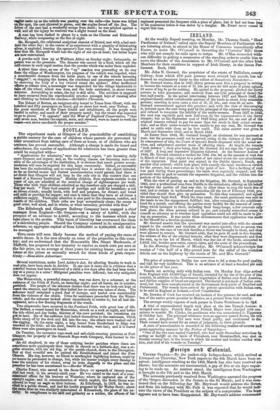Sin 413robinte3. The Reverend and Worshipful Chancellor Law, the Vice-Principal
of Queen's College, Birmingham, has taken up his residence within the walls of the College, in order personally to superintend the extended system of colle- giate medical and surgical education. He has offered to the resident stu- dents the following munificent prizes,—to the students who may obtain four medals, 501.; three medals, 301.; two medals, 71.; one medal, 51. William Sands Cox, Esq., Dean of the Faculty, has also gone into resi- dence to assist the Council in carrying out the proposed plans.
The Lancashire Central Short Time Committee held a meeting at Man- chester on Saturday; at which some of the delegates sent to London to assist Mr. Fielden, M.P., who is in charge of the Ten Hours Bill, were present. It was mentioned by the spokesman of the delegates, that after consulting with Members on both sides of the House, it was deemed expe. client to defer the second reading of the bill till after the passing of the Corn Bill in the House of Commons. Had this course not been adopted, it was stated as probable that a considerable number of Members friendly to the measure would either have voted against it or absented themselves from the House, rather than endanger the Ministers by a defeat before the settlement of the Corn question. The meeting approved of the postpone- ment.
We have again at this port [Liverpool] a decreasing quarterly revenue, arising principally _from the reductions in raw materials and articles of consumption in this district. The gross revenue of the corresponding quarter of last year, viz, the three months ending the 5th April 1845, amounted to 928,9731. To the 4th April this year, to which date the re- turn is made up, the receipts are only 793,4241.; showing a deficit ot 135,5491.—Liverpool Standard.
At the quarterly meeting of the iron-masters of South Staffordshire and Shropshire, held at Birmingham on Thursday, prices were maintained; but it was the general feeling that a tendency to a decline existed. The defalcation of a large iron-house in London cast a cloud over the meeting.
The Wolverhampton meeting was held on Wednesday. Prices were maintained.
The Ramsgate Railway, a continuation of the South-eastern Company's line from Canterbury, is to be opened on Monday, when great festivity is promised.
The Canterbury and Whitstable Railway, now the property of the South-eastern Company, on which stationary engines were formerly em- ployed, is henceforth to be worked with locomotives. Heavier rails have been laid down for the purpose, and the line was reopened with locomo- tives on Tuesday.
The Post-office clerks and distributors at Bath have made an appeal to the public against the continuance of the Sunday delivery.
A new free church was opened at Exeter on Sunday, for the first time; when service according to the rites of the Church of England was per- formed. The church is independent of the Bishop of Exeter, or any other ecclesiastical jurisdiction.
The Reverend Mr. Wells, Curate of St. Martin's-in-the-Fields, Liverpool, has conformed to the Church of Rome.
The new fortified barracks at Pembroke have at length been taken possession of by a detachment of her Majesty's Thirty-seventh Regiment: merely a sufficient force to mount a guard until the Marine detachment are removed there to occupy the remaining accommodation. These quarters are admirably situated as regards the health of the troops: they are built on an eminence, commanding the dock- yard, on which the healthful breezes of the South with the bracing airs of the North alike have their benign influence. Other fortifications for the protection of the naval arsenal are in embryo; and ere long Pembroke must become, what its locality so justly entitles it to, an establishment of first-rate importance to the British Crown.— Cambrian.
The Gloucester Chronic/et states, that Mr. James Hart, a farmer of Elton, took a lad in his employ before the Magistrates, and preferred a complaint against him for going to church instead of to the Wesleyan chapel. The Magistrates, how- ever, declared that the lad had just as much right to go. to his parish-church as his master had to frequent the Wesleyan chapel; and • the complaint, mulcting the master 111 the expenses. Mr. Hart, it is said, has since dismiaed the boy from his service.
A blunder causing a good deal of trouble occurred at the late Monmouth As- sizes. Several cases were assigned by Baron Pollock to Mr. Sergeant Allen for trial; the Judge requiring assistance, in order that he might be at Gloucester by a fixed time. After the trial of some dozen cases, it was discovered that the learned Sergeant had no power to try! It is customary to insert in commissions issued from the Home Office for the holding of Assizes the names of the Ser- geants and Queen's Counsel who usually attend the circuit: Mr. Sergeant Allen's name had been omitted. The prisoners had all to be tried over again by the Chief Baron. One of the convicts, who had been sentenced to fifteen years' transportation on the first trial, escaped with seven on the second.
At Chester Assizes, last week, Mary Evans, a young woman, was tried for attempting to poison her illegitimate infant. She gave the child red oxide of mer- cury; but as the woman who nursed it early discovered that there was something wrong, and took the infant to a surgeon, its life was saved. The prisoner wit found guilty, and sentenced to death. She has had four other illegitimate children, all of whom are dead: she was indicted some time back for poisoning one of these, but the Grand Jury ignored the bill.
At the same Assizes, Michael Burns was convicted of highway robbery on the person of Mr. Peacop, who was murdered at Rock Ferry in 1844. The convict turned approver against three men who were charged last year with the murder of Peacop; but the Grand Jury ignored the bill. Burns expected to have been admitted as a witness for the Crown, and thus to have obtained a reward of 3001.: on the contrary, his admissions have implicated himself, and he is to be trans. ported for life for the robbery.
At Taunton Assizes, on Monday, Benjamin Leslie was convicted of setting fire to a barn at Wells, the property of the Reverend T. S. H. Horner. Leslie had a spite against the prosecutor, from supposing that he had been the means of_get- tmg him turned out of a cottage. He was sentenced to be transported for life.
On the same day, Henry Yerbury was tried for shooting Biggs, a gamekeeper; and seven other men, for aiding and abetting. The outrage originated in a poach- ing affray on the lands of Mr. Homer, to whom Biggs was a keeper. All the ac- cused were found guilty.
On Tuesday, the same men were charged with night-poaching: all pleaded guilty, except Yerbury. No evidence was offered against the latter- and even his conviction on the Monday i considered questionable, as, though two men swore to his identity, it is doubtful whether he was present at the time.
During the night of Friday last, some incendiary set fire to the Grand Stand on Sutton Coldfield race-course. Being composed of wood, the building was com- pletely destroyed.— Wolverhampton Chronicle.
A guard has been killed on the North Dean and Halifax Railway: his head came in contact with the battlement of a bridge while he incautiously leaned from a carriage.
Two accidents have occurred on the Newcastle and Carlisle Railway. A flock of sheep having strayed on to the line, a train ran into them, ceasing a wholesale slaughter; nineteen were killed, and many maimed. At a place called Stella, a turnpike-road crosses the rails; as a train was approaching this spot on Monday, a horse and cart were observed dashing towards the line at a furious rate; the mine came up as the vehicle was passing over the rails—the horse was killed on the spot, the cart shivered to pieces, and the engine forced off the line. The driver of the cart had a wonderful escape from death: he was pitched against a wall, and all the injury he received was a slight wound on the bead.
A man has been dashed to pieces by a train on the Chester and Birkenhead Railway, while trespassing on the line at night.
Mr. Herapath, the celebrated analytical chemist of Bristol, met with a bad acci- dent the other day: in the course of an experiment with a quantity of fulminating silver, it exploded, burning the operator's face very severely. It was thought at fiat that Mr. Hempath would lose the sight of one eye at least; but better hopes are now entertained.
A powder-mill blew up at Waltham Abbey on Sunday night: fortunately, no person was on the premises. The disaster was caused by a flood, which set the mill-stones in such rapid motion that the powder which was under them exploded.
A short time since, as one of the "up" coaches was proceeding on its way from the village of Woolhampton, the progress of the vehicle was impeded, when a considerable distance from the latter place, by one of the wheels becoming
" ed"; on stopping the horses, the coachman and passengers were horrified by observing the body of a boy twisted round the spokes I After ineffectual efforts to release him, a messenger was despatched for the village blacksmith to take off the wheel; which was done, and the body extricated, in about twenty minutes. Astonishing to relate, the boy is still alive. The accident is supposed to have occurred from the reprehensible practice amongst boys of running after and climbing up behind the coaches.—Berkshire Chrontcle..
!The Nehant of Boston, an emigrant-ship bound to Texas from Ghent, with one hundred and fifty passengers on boanl, got on shore last week, near Torbay. By the great exertions of the Coast Guard and inhabitants, all the people were landed in safety, and mach of their property saved; but the vessel was expected to go to pieces. "It appears," says the West of England Conservative, "that only seven men, besides the captain, mate, and steward, were on board to work the vessel—not above one-fourth the proper number."



























 Previous page
Previous page